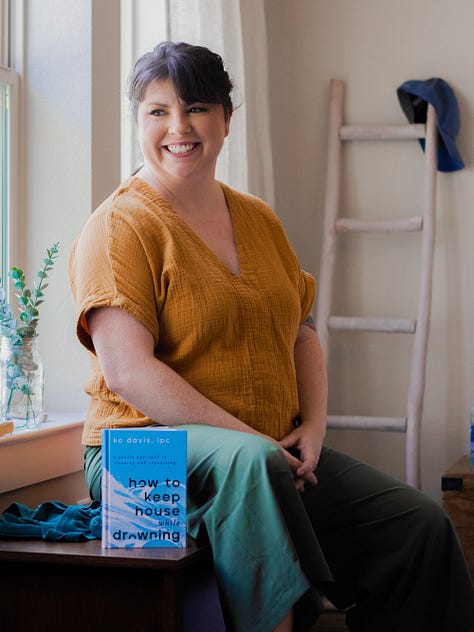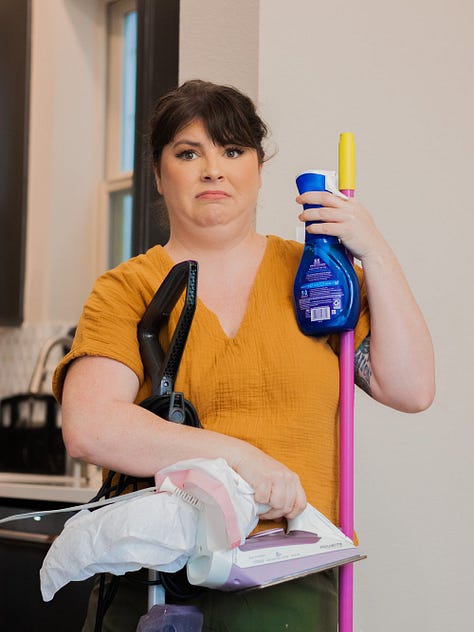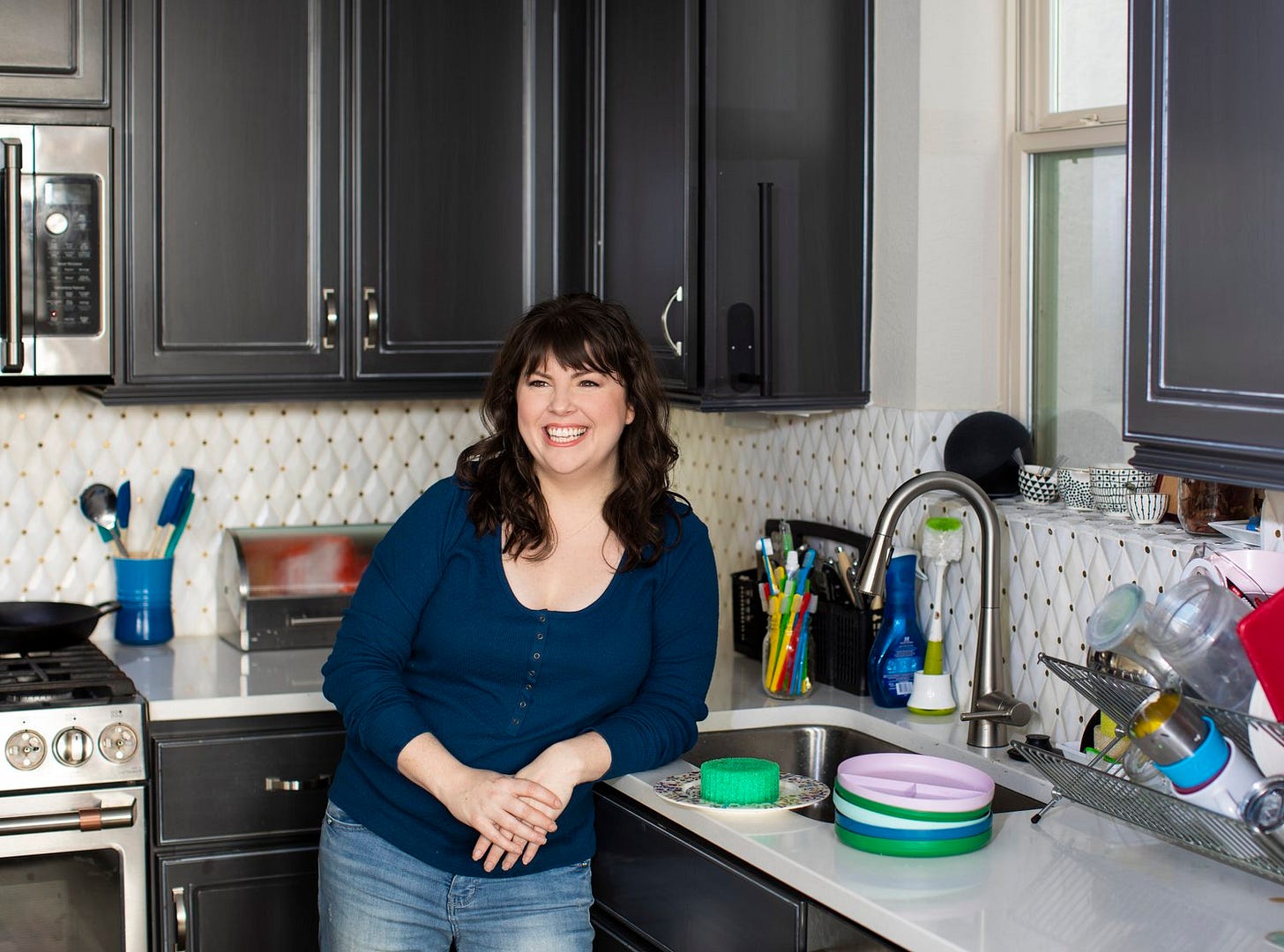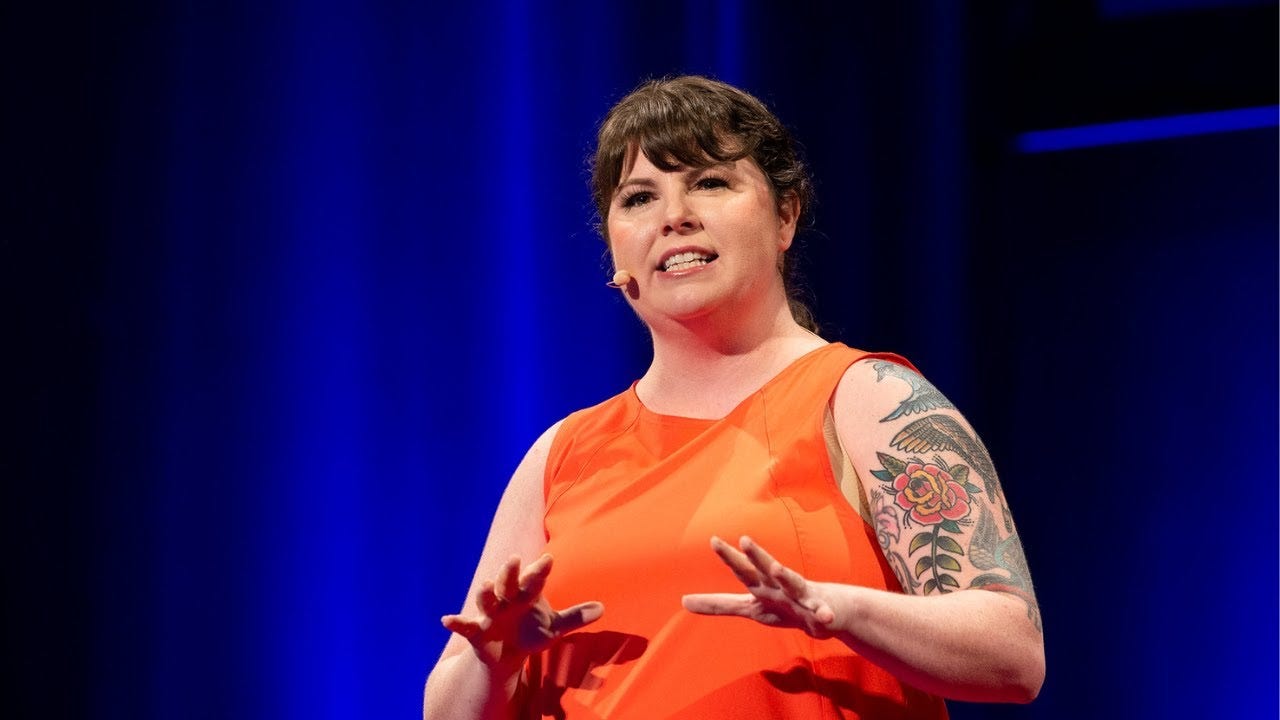“Laziness Doesn’t Exist:” A Conversation with KC Davis
It's time for a new interview! Today we talk with KC Davis, founder of Struggle Care and author of "How to Keep House While Drowning."
Our interview series features interesting people with something to say that the world needs hearing. Let me know what you think—we’ll continue to experiment and evolve along the way. 🙏
Introducing KC Davis
KC Davis is a licensed professional counselor, author, speaker, and the person behind the mental health platform Struggle Care. I first learned about KC last fall from our mutual editor, who suggested I read her book for a better understanding on writing for neurodivergent readers.
That was good timing, since I was getting ready to start this new newsletter, as well as writing my book on Time Anxiety. I found KC’s work to be provocative (in the best of ways), clear, and refreshing.
Here are a few highlights from her bio:
KC’s compassionate and practical approach to self and home care for those dealing with mental health, physical illness, and hard seasons of life has drawn over a million followers on social media in less than a year. Her book, “How to Keep House While Drowning'' has sold over 70,000 copies and is currently an Amazon bestseller.
KC Davis began her therapy journey at 16 when she entered treatment for drug addiction and mental health issues. After getting sober she became a speaker and advocate for mental health and recovery. Professionally, KC has worked most of her career in the field of addiction in roles such a therapist, consultant, and executive director. She lives in Houston with her husband and two daughters.
Since this is 🌻 A Year of Mental Health, I’m interested in how people think about wellbeing in general.
So let’s have some questions and answers with KC!
Qs & As with KC
What does mental health and wellbeing mean to you?
The ability to function in life’s daily demands while simultaneously experiencing contentment and joy.
What is your primary or most important message?
No one is doing all the good things all the time. Recycling, eating healthy, exercising, gentle parenting, ethical purchasing, getting outside enough, limiting screen time, supporting local elections, donating money, being informed on issues, creating community… there are so many good things for us to do and the internet can sometimes become a barrage of all the things we should be doing well in order to consider ourselves a good and ethical person.
For some of us, this just becomes a list of thing we are failing at daily. The perfectionism can be suffocating. I want everyone to hear the message that you are not morally obligated to do all the good things at all times. You will burn out that way. The goal is to focus on your immediate functioning and harm reduction, then to widen your influence in such a way that you are choosing to prioritize a few good things. Then in the next season you may prioritize more or simply different good things.
What’s something contrarian or highly unusual that you passionately believe?
That laziness doesn’t exist. As a therapist I’ve never gotten to the bottom of why someone struggles to do something and found it as just because they were lazy. There is almost always a legitimate barrier like pain, fatigue, executive dysfunction, overwhelm, burn out, lack of support, differing values, mental health issues, etc. Sometimes the issue is that someone is exploiting the labor of another—as in the case of unequal household labor. But even in that case the issue isn’t laziness but entitlement.
KC’s Audio Recording 🎙️
I usually ask our interviewees to make a short audio recording in addition to the written questions. This isn’t a long podcast interview, it’s just two minutes long—so you don’t want to skip it. Here’s the one from KC! ⬇️



Okay, back to some more Qs and recommendations!
What’s difficult for you right now? What are you struggling with?
I’m in a phase of my life where I am learning to reclaim space for myself. Society tells us that mothers ought to be constantly sacrificial while asking no one around them to do the same. I followed that for a few years and burnt out hard during the pandemic. Now my kids are a little older and I am learning how to be a present and engaged mom that also shamelessly claims her own right to space, time, and identity.
What is a simple thing (or 2-3 simple things) we can do to be better?
Stop trying to be better. It’s an endless rat race of perfectionism you will never win. You are not morally obligated to self-optimize every aspect of your life. You do not need to be a special degree of healthy or optimized or productive or righteous in order to deserve kindness and love and belonging.
Focus first on functioning and harm-reduction, gain the skills to care for yourself in the day to day while dealing with any issues that are causing direct harm to those around you. Fight hard for that. Once you are there, breathe. Life is long and you can be on a journey of growth that doesn’t demand constant naval gazing and berating yourself for your failures.
People who are constantly trying to be better are constantly thinking of themselves. What would it be like for you to have a day where you didn’t think about yourself so god damn much? A day where you woke up and noticed the weather, enjoyed a laugh, connected with people, fed your body, did something that made you feel creative and productive, helped someone not so you could check the box of worthiness or pat yourself on the back for doing what you should but because helping and giving is a form of connection to a human and to the human condition as a whole and that feels worth it.
What if you had a day where things were hard and painful and instead of worrying about what that means is wrong with you or that nothing will ever be okay or how you must be screwing up to be in so much pain you just did as the poet Rumi suggested and met it at the door laughing and invited it in–because that too is the human condition. Everything changes as long as you keep moving. Think about how your actions affect those around you and after that think less about yourself.
Lastly, what are a few things you’d like to recommend to our community?
I’m really into reading fantasy books right now. Just for the pleasure of it. The kinds of fantasy romance that people love to make fun of 37 year old women liking. I don’t care. It’s delightful and I think we should do more of what delights us.
Big Thanks to KC!
Be sure to check out the book How to Keep House While Drowning, as well as her TEDx Talk How to do laundry when you're depressed.
As always, let me know if you were able to read the interview! More of them are in the works, so be sure you’re subscribed—and stay tuned. 🙏








I’ve noticed over the years that younger parts of me believed that being responsible is the same as being a good person, even though the two things are completely unrelated.
Having unconditional positive regard for myself means that even if I don’t get the laundry done, or I don’t complete a task, that doesn’t make me a “bad person.“ It just means I didn’t have the energy today and it wasn’t in the cards!
Parts of me often used to say, after completing a task, “I’m good!”
I would counter: “No! Completing a task does not make you a good person. You’re always a good person whether you get the task done or not. It just makes you responsible. You always were good, and you always will be good, whether or not you get something done.”
My parts got sick of me constantly correcting them — because I’m never going to accept the comment “I’m good“ after I complete a task. Now they’ve switched their internal dialogue to, “I’m responsible,“ after achieving a task, to avoid having me correct them.
Success! I have effectively cut the connection between achieving a task, and believing that makes me a good person or morally worthy.
It was slightly annoying to retrain myself this way, but I’m very happy with the results. Now, when I complete a task, and I hear in my head, “I’m responsible,“ it feels so much friendlier. My self-worth does not depend on whether or not I get things done, and it’s nice to hear that accurately expressed by the internal voices in my head (my parts).
“What would it be like for you to have a day where you didn’t think about yourself so god damn much?” !!!
Wow, this interview was fantastic. I’m glad I read it before my day started, because it’s going to stick with me. I have fallen into the trap of self-optimization so much that it’s almost like an addiction, and/or a coping mechanism from not getting hurt.
Such an important message. Thanks for this!